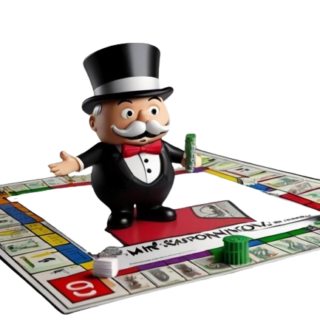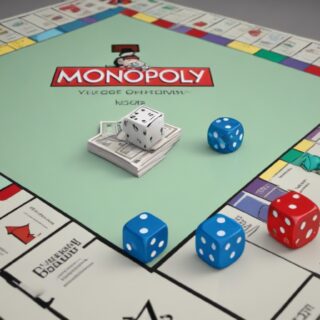Monopoly Rules: Understanding Free Parking
In the iconic game of Monopoly, one of the most misunderstood spaces on the board is “Free Parking.” Many players are unsure of what exactly this space means and how it affects gameplay. In this blog post, we’ll delve into the rules surrounding Free Parking and clarify its role in the game.
Free Parking in Monopoly serves as a neutral oasis amid the cutthroat real estate battles, a moment of respite where strategy pauses and players breathe easy.
What is Free Parking?
- Free Parking is one of the corner squares on the Monopoly board, located between the “Go to Jail” and “Just Visiting” spaces. Unlike most spaces on the board, Free Parking does not require any action from players when they land on it. It is essentially a neutral space that does not result in any penalties or rewards.
Common Misconceptions
One common misconception about Free Parking is that landing on it entitles a player to receive money from the center of the board. Some house rules suggest that any fines, taxes, or other fees paid to the bank are placed in the center, and a player who lands on Free Parking collects this money. However, this rule is not part of the official Monopoly rules and is considered a house rule.

The Official Rule
According to the official Monopoly rules, landing on Free Parking has no effect on gameplay. Players do not receive any money or benefits from landing on this space. It simply serves as a breather in the game, allowing players to pass by without any consequences.
Why the Misconception?
The confusion surrounding Free Parking likely stems from the desire to inject more excitement and unpredictability into the game. The idea of collecting a windfall of money from the center of the board can add an element of surprise and strategy. However, it is important to note that this rule is not part of the original game design.
Conclusion
While Free Parking may seem like a mysterious and potentially lucrative space on the Monopoly board, its true purpose is much simpler. It is a neutral space that does not impact gameplay in any way. Understanding this rule can help clarify the game’s mechanics and ensure a fair and enjoyable experience for all players.
What comes with the game
Here’s a table outlining the components included in a standard Monopoly game:
| Component | Description |
|---|---|
| Game Board | The board consists of 40 spaces representing properties, railroads, utilities, and special spaces like Chance and Community Chest. Players move around the board buying properties and collecting rent. |
| Tokens | Tokens represent players on the board and include classic items like the thimble, top hat, and car. Players choose a token at the beginning of the game. |
| Money | Monopoly money comes in different denominations and is used to buy properties, pay rent, and manage finances throughout the game. |
| Property Deeds | Deeds represent ownership of properties and include information such as purchase price, rent cost, and building costs. Players collect deeds when they buy properties. |
| Houses and Hotels | Players can purchase houses and hotels to increase rent on their properties. Houses are placed on properties to indicate rent increases, and hotels replace houses for higher rent. |
| Chance and Community Chest | These cards are drawn when a player lands on the corresponding space. They contain instructions that can be beneficial or detrimental to the player, such as paying or receiving money, or moving to a different space on the board. |
| Dice | Monopoly uses two six-sided dice for movement around the board. Players roll the dice to determine how many spaces to move on their turn. |
| Banker’s Tray | The banker manages the game’s money and properties. The banker’s tray includes compartments for the different denominations of money and property deeds. |
| Rules | The rulebook outlines how to play the game, including setup, gameplay, and winning conditions. It also includes information on optional rules and variations. |
| Mortgaged Property Cards | When a property is mortgaged, a card is placed on the property to indicate that it cannot collect rent until the mortgage is paid off. Players can mortgage properties to raise funds. |
| Houses and Hotels Tokens | These tokens are used to represent houses and hotels when purchased by players. They are placed on properties to indicate the level of development and the increased rent value. |
FAQ
- According to the official rules, nothing happens when you land on Free Parking. It is simply a neutral space where no money is exchanged, and no actions are required.
- Yes, many people play with house rules where money collected from taxes, fines, and other payments is placed in the center of the board, and the player who lands on Free Parking collects this money. However, this is not part of the official rules.
- The house rule of collecting money on Free Parking adds an element of excitement and can help struggling players get back into the game. It has become a popular variation even though it’s not in the official rulebook.
- Officially, Free Parking is just a resting space where no action is taken. Players can choose to implement house rules, but for a game adhering strictly to the official rules, no money is collected or paid out on Free Parking.
- No, official Monopoly tournaments follow the official rules set by Hasbro, which means Free Parking is just a neutral space with no associated rewards or penalties.
- Free Parking was designed as a neutral space to give players a break from the various transactions and penalties encountered on other spaces. It provides a brief respite in the game.
- Using the house rule of collecting money on Free Parking can extend the length of the game because it introduces an additional influx of money, potentially delaying bankruptcies and keeping players in the game longer.
- Yes, house rules can be adjusted to either include or exclude money collection on Free Parking based on the desired game length and player preference. However, altering the rules can significantly change the game’s dynamics.
Ready to roll the dice and take on the challenge of becoming the ultimate property tycoon?
Set up the board, and let the wheeling and dealing begin!
Time to buy, sell, and trade your way to victory in the timeless game of Monopoly.
Who will build the biggest empire and bankrupt their opponents? Find out now by starting your Monopoly adventure


